After Chief Keef’s Interview on Hiding Pain with Silence
Serenity Hughes
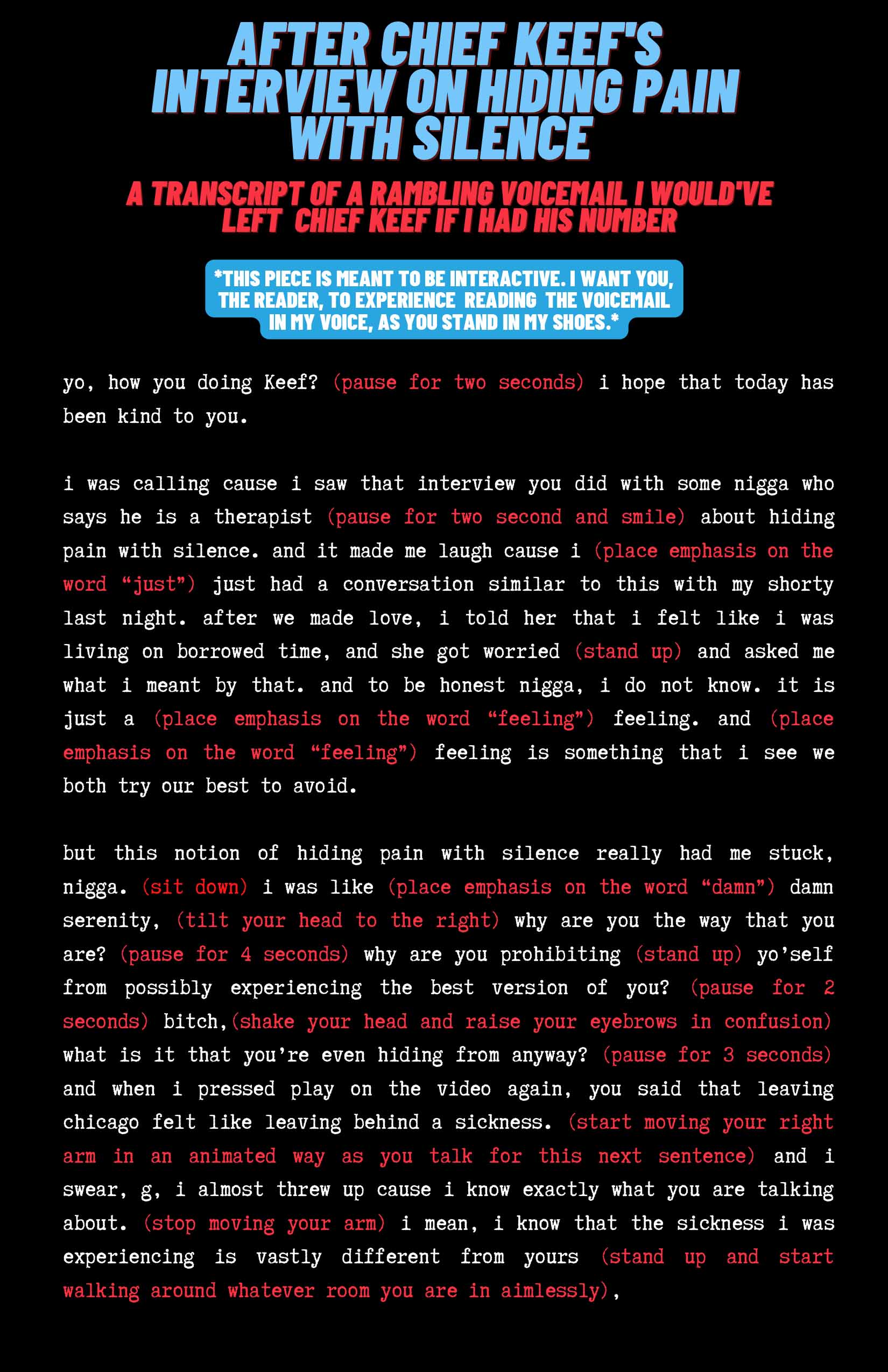
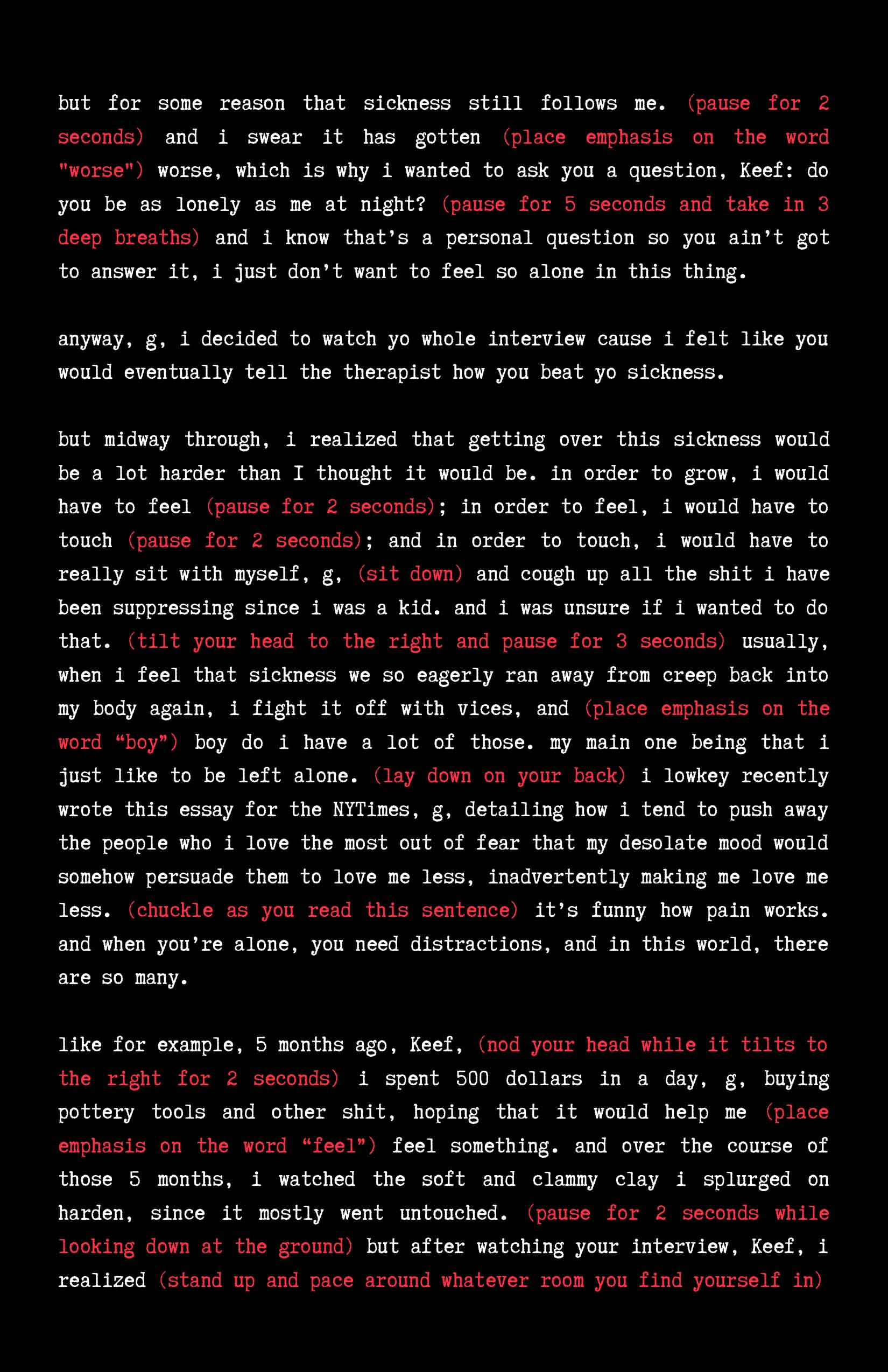
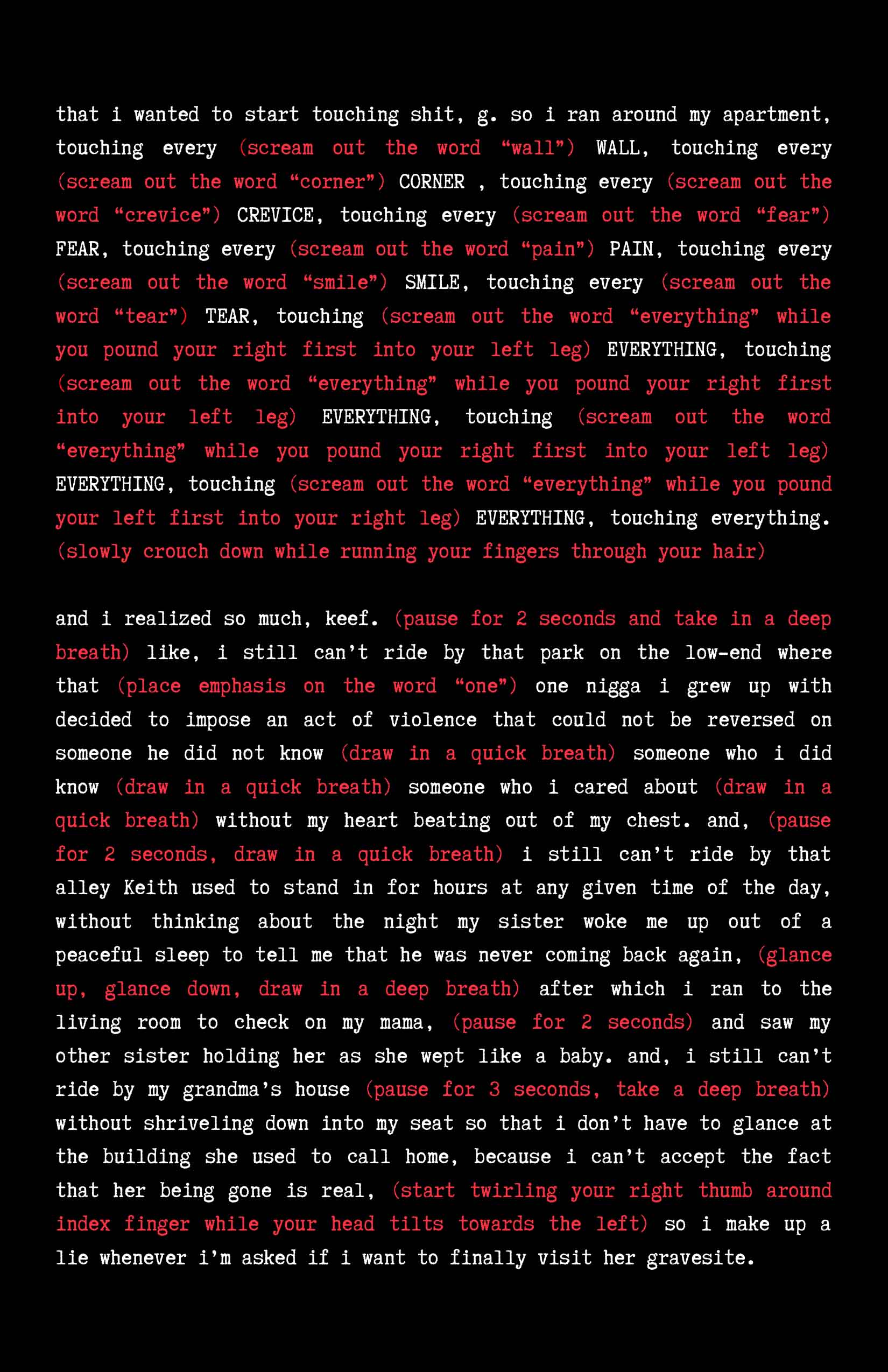
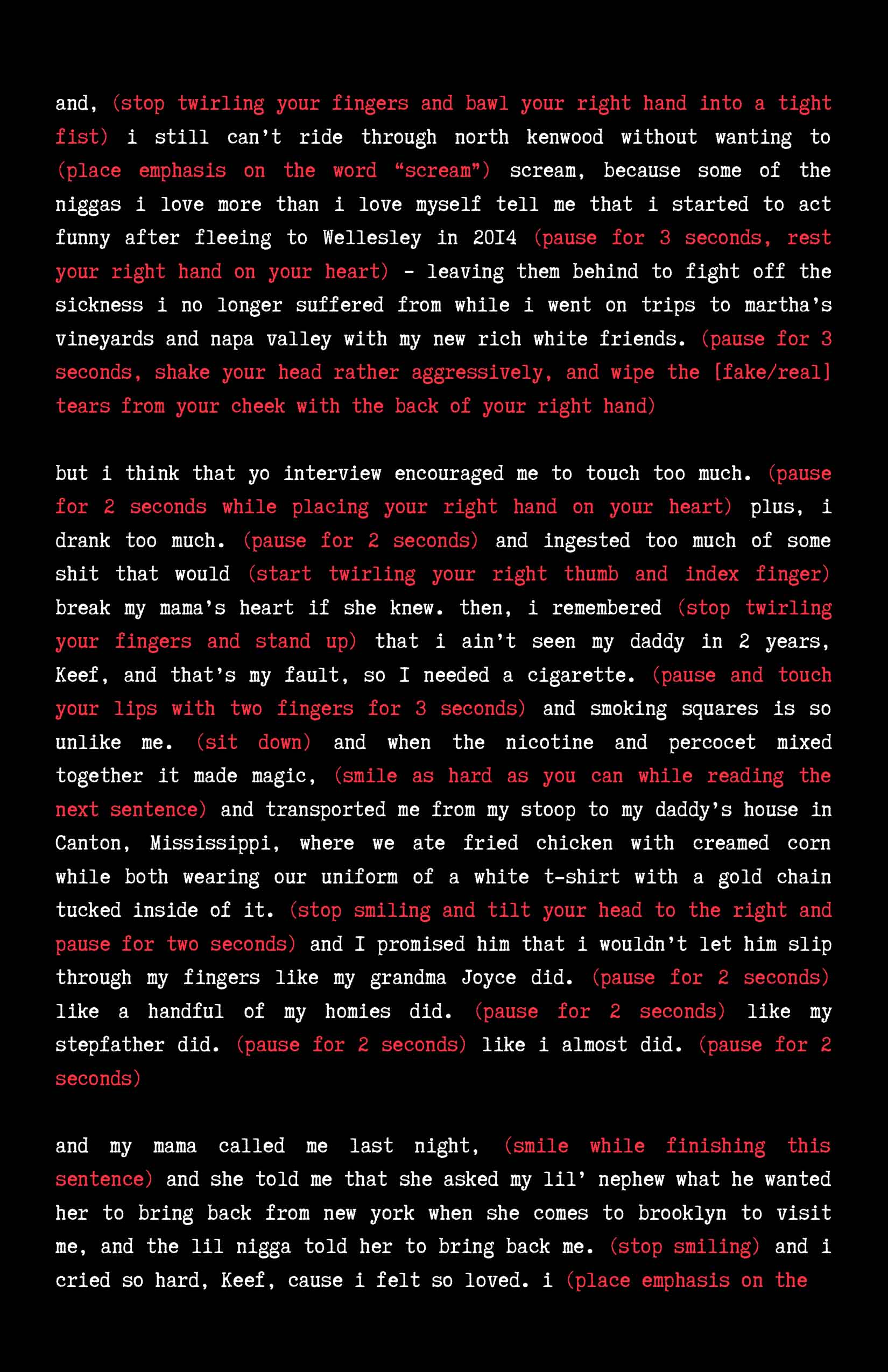
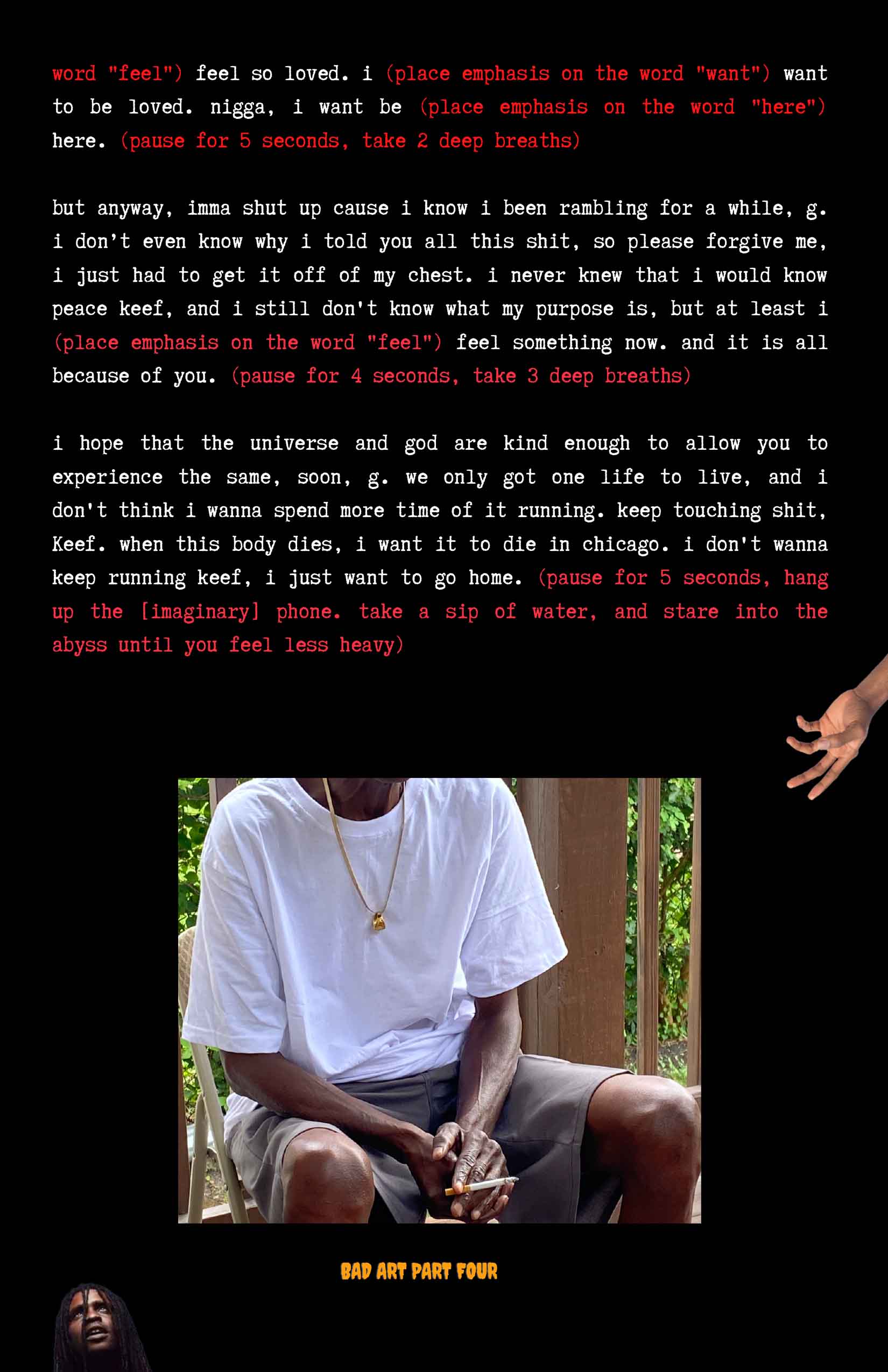
Celestial Sunchoke
jonah wu
On the day of my father’s death, I spoke to his ghost.
I bring this up now because it’s sunset, and I’m watching the pink-orange light streak across L.A. as my bus razors a route through it. Hollywood calls this golden hour, but to me, it’s always been the haunting hour — it’s the time of day when ghosts spill out of whatever uncanny nook they’ve been hiding in and flood my senses. I can never see them, and I rarely if ever hear them speak. Rather, it’s that when the sun meets the horizon line, a door opens, and suddenly rushes in the wordless stream of their emotions.
Sometimes they want very little. Sometimes they just want someone to know that they are here, that they were once alive, before they travel once again into the darkness. Sometimes they stay for a while, projecting all of their past regrets, their aborted desires, their sorrows. If they disappear, it means someone they love has collected them, and maybe they’re able to move onto that other world. But my father, he still lingers. Behind me, over my shoulder, in the shadow of my step. I am not someone he loves. Our last conversation while he was still alive, three years before he passed, was an argument about — of course — my queerness. And then, when he died, he came through the door for me. To see me, I guess. Where I’d ended up.
If it were anybody else, they would have probably told their father-ghost not to worry, they are eating well, they’re a good person now. Not me. I’d never been able to promise those things. Instead, I’d become my parents’ worst nightmare: I was living free as a derelict of society. Of theirs, anyway. I was highly sought-after in mine, having accidentally become some sort of spiritual advisor in the local queer community. Drunk one night at one of those Los Feliz house parties, surrounded by a gaggle of other drunk queers, I had started railing at the limits of talk therapy. How it couldn’t address the day-to-day harm of capitalism, how it often perpetuated the harm of capitalism by being unaffordable to the people who needed it the most. And how, because therapy now carried the reputation for being a cure-all, it’s become untoward to express a single negative feeling outside of it. You should talk about this to your therapist, an ex once told me. But that was the thing — I needed to talk to him about it. I needed to explain to him how my mother had thrown me out for the audacity of being non-binary, trans, queer, and for refusing the name she had given me in favor of my own. That even before that, she had so obliterated my sense of self that I had only just re-discovered it, and that she had carved in me so many emotional black holes that I would be inept at all of my relationships for the rest of my life. But if all of my resident traumas were condemned to a room that only existed from ten to eleven A.M. every Saturday morning, how was I supposed to heal from them?
I don’t know if it’s because inebriated valor eventually goes infectious at these types of parties, but people started to voice their agreement. More unexpectedly, they shared their own frustrations about going unheard by friends, or having to hide their depressions and anxieties at work, and that led to a conversation where they revealed their ancient anguish and primal fears, how the people they used to love had hurt them so much it was terrifying to love again. I had triggered a round table talk about trauma, and the strangest part was, it was fun. We offered our own words of advice and encouragement, and we laughed as much as we cried. Somehow, that night, a transcendent magic had captured the room, eroding the lines between one self and the other, allowing us to speak to each other truthfully, honestly, without fear. By the time we left the party, we had all felt like changed people, and as a friend and I ran to catch the last train home, they turned to me and shouted — Celestial Sunchoke, that was amazing! You have got to do that again!
Even though it had been a totally unplanned act of serendipity, and I wasn’t even sure how to recreate it. But the night had taught me that there were so many in my community, not just me, who needed an outlet. Not therapy, nothing clinical, but just a safe space to share. I started attending more parties, picnics, and dinners. More than as an introvert I was accustomed to. Always unscheduled, impromptu. I never announced when I’d be coming, or if I’d show up at all. Even crashed a few get-togethers I wasn’t explicitly invited to. That was the magic, I was convinced, the organic nature of these group talks. And because I was the one initiating them (and likely because of my admittedly self-important name), people had come to expect me as a kind of life coach. I was getting asked all the time to weigh in on interpersonal issues, or to rescue a friend from desolation. This, I had complicated feelings about. I didn’t exactly enjoy being viewed as everyone’s savior. At the same time, there was an insidious lure to being seen that way. As if I had all the answers, as if nothing could ever bother me. I was getting so wrapped up in the role that I’d come to believe it myself.
When my father’s spirit came to find me, I’d been doing the impromptu party sessions for a few exhilarating months. At once I knew it was him — his singular and overwhelming guilt raking over my spine. The crawl it sent up my back. He’d been in and out of my life since I was eight years old, sometimes gone for as long as five years before I saw him again, and our last encounter, if you can recall, had ended in disaster. By now I’d come to resent him wholly, even his death, which he had come to burden me with. His guilt ran like a hot coolant along my scars, all the welts my irascible mother had left me in his absence — all those still present, and also the ones that had long since been healed by time. He hadn’t known about the scars. He didn’t know it had gotten that bad.
“Well, it did,” I said out loud. I would ignore him, I decided. It had been a long time since I last tunneled down a hole so deep no one could rescue me from it, and I would not let those vicious, errant emotions affect me now. I could simply pretend that I had no skill to understand him. Enough time would pass, and like everyone else, he would eventually leave me alone.
But then he begged me with the words he could: please, hear my one request. Please, 小兔子. Go look after your mother.
One of the Buddhist hells, I remembered, is called “black-line hell.” In Chinese, hēi shéng. When cast down to this realm of dìyù, the sinner’s body would be drawn all over with black lines, and hell’s attendant ghouls would pass down punishment by slicing the sinner along the lines into pieces. Then, slowly, the meat would slither back together, joining at the seams. Only to get chopped up once again. So on and so forth, punishment meted over and over, trapped in a reality where violence replays itself, for a stretch of time so long that it might as well be eternity, with no route for escape. I traced a hidden spot on my hand, known only to me. When I was seven, my mother had slashed me there with a pair of gardening shears. I hadn’t tidied up my room correctly, perhaps, or I had given her an answer she hadn’t wanted to hear. Impassively, I had watched the blood pearl along the thin, dark line newly creased into my skin. I thought it would leave a scar there, to serve as an eternal reminder of my persistent failures. Instead, the wound buried itself. It became a secret between me and the ghoul who would, one day, find it with his swinging glaive and cleave it open once more.
“How dare you.” My fists, clenched, shook. “How dare you use those words against me” — my rage luminescent — “and ask that of me” — and now came the tears.
Was it his sorrow that I felt, or mine? He responded, simply, that he had his regrets. He possessed no aptitude for family; his had disappeared early on. So had my mother’s. They had absconded like fleeing rats on a leaky ship, all the way across a treacherous ocean towards the new country. Fueled only by the sheer anger, the raw umber, one draws on for survival. But when they finally arrived at their new home, they had forgotten to leave the war tactics behind. Every room was still a battlefield. My childhood a graveyard.
He said, I want to fix things. I can only do that through you.
For the first few months, I refused. I figured I owed them both nothing — and I was right. Yet knowing this gave me no relief. After a particularly difficult and overwhelming group talk, I ran all the way home, I barreled through the city and burst through my front door, collapsing into a fit of tears right then and there. “I know you can hear me!” I screamed at the ghost in the room. “Why is this my curse? After all this — why do I still feel so empty?” And even after I had done all that “healing.” The haunting was never truly gone. All ghosts will rise to meet you, wanting air.
And there my father lingered, his earthly grief painting a hole into my back.
Three stops away. The sun continues its long descent into the belly of space, humbling me at the terrestrial level. My bus shakes and rattles me. Out of habit, I glance down and check my phone — one new text, from Talia, five minutes ago. Lost in thought, I hadn’t noticed it.
It reads: Hey, just checking in. How are you doing?
I consider briefly whether to lie. Could be better, but overall a-okay. I lock my screen, and after a moment’s hesitation, I re-open it. Thank you for asking.
Talia, I met at a party last month, and she was so engaging that I ended up spending the whole night talking only to her. A so-called “baby trans” who’d only just started test-driving her name, borrowed from the Batman character Talia al Ghul, and that’s how we started our conversation — criticizing the sheer and blatant Orientalism of the character, as well as the various men who wrote her. We both agreed that writers shouldn’t have depicted her as an abusive mother, that it was a betrayal of her character. “These men don’t know anything about women,” Talia said, “certainly not women like me.” And yet, and yet, she loved Talia al Ghul. Her villainy, and her deep passions, too, which could not be extricated from the other. Much like the people we tend to love in waking life.
Talia had approached me because she wanted my advice. Had heard about the type of guidance I provide at social gatherings, and especially wanted to know how I, a queer Asian American like her, navigated coming out to my family. The more I talked, though, the fewer answers I had for her. I didn’t figure it out, I said, my mother disowned me for a time and my father died while we weren’t speaking to each other. Her calm, unhurried demeanor made her exactly the type of person one finds themself unwittingly confiding too much in, so I ended up telling her about the ghosts. My father’s. She listened quietly, nodding. “Anyway,” I hastily concluded, wanting to shift her attention elsewhere, “I don’t want to talk only about myself. What about you?”
“Me?” She seemed taken aback. “I don’t have anything more interesting to share than that. I have no spiritual awareness at all.”
“How do you know that?”
She laughed. “Because when you’re queer, you’re surrounded by about ten people who are into witchcraft. And, inevitably, they rope you into doing all sorts of spells and rituals with them. Feel the energy, they told me, witchcraft is about energy. I never felt a single thing.” She leaned in, as if imparting a secret. “And I’ve never experienced a haunting I can’t explain.”
Never? I find that nearly impossible. I feel energy wherever I go. Every few weeks, a new ghost melts in with their woes. On top of all the others who already weigh me down. It’s almost too much to bear. To my surprise, she took my hand between her own and clasped it tight. “I wish,” she said, with real pain in her voice, “I could take some of that from you.”
It scared me so much, the sudden closeness, that I froze completely. Even though we exchanged numbers at the end of the night, I avoided her for the next week. I apologize, she later texted me, if I violated a boundary — no, I replied, you didn’t. But neither did I elaborate.
In truth, I wish I could explain to her how much her gesture meant to me — how gently she held my hand that night, and didn’t let go until it was time for us to part ways. How she had wanted nothing from me and asked nothing from me, only my burdens. And to tell her this would have required me to admit that no one prior had allowed me such one-sided selfishness, that perhaps I had set myself up in a painful series of transactional relationships in which I had to prove my own usefulness for belonging, and that was a truth too naked to bear. Instead, I dialed back my friendship with her to what I felt was manageable. Small talk through texts. The occasional jaunt for coffee. An intimacy at arm’s length: hypocrisy.
Another phone notification comes in from Talia: how’s the light looking on your end?
I smile in spite of myself. The question is endearingly childish, like when you ask your best friend who lives on the other side of the country, are you looking at the same moon as I am? I snap a photo of the dimming sunset and text it to her. She sends back a heart emoji.
The next stop is mine.
East of L.A. proper, the world is quieter. Twilight dampens all of my familiar streets in bluish melancholy, until they’re no longer recognizable as the neighborhood I grew up in. Or, maybe, now that they reflect reality, they’re finally being honest about who they are.
That old door. With all its bumps, nicks, and bruises, and its peeling paint. I meet it with my key. Slowly, at first, and then I push with full force. That smell: I’m home. None of the lights are on. I close the door behind me. Like shutting myself back into the void.
From muscle memory alone, I find the light switch on the wall. And there she is — my mother, curled up like a small animal in one corner of the couch. She’s rearranged the living room since I last came over, I notice. The TV is new, and the houseplants have been cut down to their stalks. She must’ve forgotten to water them again.
I kick off my shoes, find an unattended pair of slippers to shuffle into, and slide through the living room until I get to her. She’s deep in sleep; I’m being loud. Kneeling down until I’m eye-level, I tap her shoulder. “Mom?” I’m scared of touching her. This time, I reach out, and I shake her until her eyes open.
“Ah,” she mumbles blearily, blinking her way out of an old dream, “it’s you.” Steadying herself on her elbow, she looks around. “What time is it? Is it too late to drive you to school?”
Softly, I scoff. “It’s been a long while since I’ve had to go to school.” My hands guide her upright, and then I go into the kitchen alone. For the last half-year, I’ve been coming over to my mother’s house every week to cook her dinner. She’s never been able to cook well, and without me, she’d be eating the same frozen meals as she did when I was a child. Opening the fridge, I peer inside. There’s the pork belly I splurged on earlier this week, stalks of scallions rubber-banded together, an assortment of leafy greens. I start making the mental calculations. Let’s do our favorites tonight. There’s a couple of tomatoes and eggs left, let’s do fan qie chao dan, which everyone always whips up for their kids, even my own mother, who could set a block of tofu on fire without meaning to. I weigh the tomatoes in my hand, squeezing them to check their ripeness. Good. I set them aside on the counter. Next, let’s braise the pork belly hong shao style, add blanched bok choy at the end to soak up the sauce. And of course, there’s the rice. Which she’s running low on. I should restock next week. Bring some of the bread I’ve been baking.
I can hear her from the living room, watching some reality show on the television. My knife makes quick work of the scallions, thin, thin, thin. A singing competition show, she’s always liked those despite being horrifically tone-deaf, but she enjoys, I think, critiquing each contestant as if she’s a judge on the panel herself. I swing a cleaver through the meat. I think again of hēi shéng. The hell that is filial piety, even when you’ve gone so far to abandon it. When I was in college, I had taken a course on Chinese Buddhism, for my own curiosity, but also in the vague, distant hope that there were as many cures in my culture as there were whips and flails. One of the stories I read for class was about the disciple Mùlián, who had discovered that his late mother was suffering in the deepest and cruelest pit of dìyù, as punishment for her misdeeds, and so begged the Buddha to free her from her suffering. In awe of Mùlián’s devotion, the Buddha agreed, so long as Mùlián reset his mother’s karmic balance by offering a grand feast to the monks returning from their months-long retreat. You’re not really supposed to do that, I remember our professor had told us. As a Buddhist, you’re supposed to renounce all earthly attachments, and that includes ties to your own family. But, despite his mother’s sins, Mùlián had moved heaven to rescue her from a hell she could not escape alone.
It always used to anger me, Mùlián’s story. But now I pick up my mom’s pain meds from the pharmacy, help her navigate the house with her bad hip, and make sure that I cook enough leftovers so that she can eat them throughout the week without resorting to take-out. And now the resentment I held against Mùlián has been shouldered by my friends. Especially the other Asian Americans. You don’t have to do this for her, they tell me, any of this, when she’s never done the same for you! I know this, of course. I know this better than anyone.
The rice cooker beeps its chipper song, and the pork belly is done braising. “Mom!” I yell over the steam curling in my face. “Come eat!”
All of the dishes have made it to the table, and she hasn’t. “Mom!” I can still hear the acerbic rejoinders from Simon Cowell, or any one of his copycats. The studio audience getting rowdy. I sigh, wipe my hands on a dish towel, and make my way back into the living room. “Mom?” She looks at me. I cross my arms. “Did you hear me?”
She flashes me a girlish smile. “Aiya, a few more minutes. It’s almost over.” I pick up the TV remote, hit the power button, and silence mutes the room again. “Come. Food’s getting cold.”
Obediently, she follows me back into the kitchen, her hand supported by my shoulder, and I help her into her favorite chair. We always sat in the exact same spots for dinner every night, my parents and I. Like Nietzsche’s amor fati. We kept coming back to the same scripts, as if they were inescapable.
“小兔子,” she calls me. “Bunny.” She’s learned to stop gendering me, but not infantilizing me. I pop the lid of the rice cooker open, and hold my hand out so she can pass me her bowl.
“What is it, Mom?”
Into my palm rests the cool, blue curve of porcelain. I look back and catch her frowning. “How old are you now, Bunny?”
“Older than you think I am.” Brimming, the bowl returns to her. “Eat.”
“Hm.” She straightens the chopsticks in her grip and picks through one of the dishes to find a chunk of pork belly. I sit down across from her, watching her chew.
“How is it?”
“You cook like your grandma,” she reports, mouth still full. “You have the instinct. Everything comes easily to you. Not like me.”
The chopsticks grow slack in my hand. “Not everything,” I mumble, and then I, too, poke through the vegetables to get at the meat. For something that will fill my fill. My mother once thought that I was some infallible creature beyond her understanding, capable of anything she herself couldn’t achieve, and so punished me terribly every time I revealed myself to be fallible. I hope she knows now that I am human just like her. Just like I once saw her as the indomitable monster of my life, and now she is just a woman named Wendy. She is losing her memory to the ravages of time, and one day, so will I. One day, when we are in dìyù, toiling for our sins, I hope all this will no longer matter.
After we finish eating, she falls asleep on the couch again watching the evening news, and I pull a blanket back over her. In the darkness, she escapes my eyeline. My father sits heavy in my bones. I don’t really mind his presence anymore; it’s just that every time he does, I feel like crying.
Closing the front door and locking it behind me, I walk out into the night. The cold desert air fights its way into my lungs, brittling me from the inside. Without thinking about it, I pull out my phone and start texting Talia. Can I talk to you — no, can I ask you to come meet me?
She doesn’t take long to reply. Sure. Address? I send it to her. Is everything okay?
Huh, I wonder. I really thought I was okay. I really thought that if I let everyone around me treat me like a wise soul, like I knew any better, that the wisdom would transfer onto me and act as a shield. That if I could figure out how I’d feel about a situation beforehand, it wouldn’t break me like I’ve broken before. Attaining enlightenment by letting go of earthly attachments. Releasing myself from the cycle of suffering. It’s an attempt to control a life I’ve never been able to control — my habit of calibrating and predicting my own reactions, so that nothing will surprise me. But I am robbing myself of some sort of living. I just know it.
I start pacing in a little oval on the sidewalk. I don’t know why I’m getting so agitated. Actually, I do know. I feel like a fraud sometimes. Like I’m tricking everyone into thinking that I’m a good, whole, decent person. When the reality is, I hold grudges, I am childish, I have my irrational moments just like anyone else. I know who I am. Why doesn’t anyone else?
Hey, I just got in the Uber. Breathe. Are you breathing?
I’m trying.
Good, she says. And I don’t think you’re tricking anyone at all.
No? I hold both of my arms close to my chest. Even though you’re the only one I’ve ever told this to? Even though I constantly advise others on emotional intimacy, but I don’t know the first thing about it?
Yeah. It’s difficult to talk about these things, isn’t it? But that’s why those group discussions you host are so important. You create an atmosphere where people feel comfortable enough to be vulnerable, maybe for the first time in their lives. And one day, when they’ve got enough practice with opening up, they can do it by themselves. In the outside world. On their own, with their own two feet.
Me too, I want to tell her, one day, I want to be able to do that too.
I know you must hate that term, though — “group discussions.” Makes it sound like school. What should I call them instead? Happenings?
I don’t want to call them anything. It would create unnecessary formality. If we give them a name then we start setting up a time and place and soon we’re boxing up our emotions in temporal confinement again. No, it’s better not to make them a thing. I’m not going to do them forever. Only so long as people need them. Only so long as I can tell them what I’ve always wanted to hear: I love you, friend, and I make you laugh.
She’s quiet for a while. I think I get you now, Celestial Sunchoke.
Do you? What’s my deal, then?
It’s deceitfully simple. You see yourself in everyone you meet. And you can’t help but try to save yourself, over and over again.
That may be so.
But then again, I don’t know you well, not yet.
No, I think you’re right. I think you’re absolutely right, I’m just afraid of being seen. Hey, I’m looking up at the moon right now, waxing gibbous. Are you looking at the same moon as I am? God, I hope so.
Talia goes silent for two minutes. I walk up and down the block, and then up and down again. The whole night is holding its breath, squeezed tight in anticipation. For what, I don’t know yet. Then I hear:
“Celestial Sunchoke!”
I turn around, though I know whose voice it is. There she is: running up to meet me, in a new dress from Radical Goods, Talia is gliding along the sidewalk. I catch her embrace in my arms.
“Celestial Sunchoke,” she says into my ear, “the whole way here, I was trying to think of a joke to tell you, but the only thing I could think of was, Why did the chicken cross the road? To get its egg cracked. And it barely even makes sense on a trans level.”
“What?” I burst out laughing. “Why?”
“Because.” She holds me tighter. Behind her warmth, the moon disappears, bringing all lingering ghosts with it. “I wanted to tell you that I love you, my friend, and that I make you laugh.”
Serenity Hughes is an essayist from the South Side of Chicago. Their work can be found in The New York Times Magazine and 68to05. They were a 2021 Periplus Fellow, and currently resides in Brooklyn, NY.
—
jonah wu is a queer, non-binary Chinese American writer and filmmaker currently residing in Los Angeles, CA. Their work can be found in Longleaf Review, beestung, Jellyfish Review, Bright Wall/Dark Room, The Seventh Wave, smoke and mold, and the Los Suelos anthology. They are a three-time Pushcart nominee and winner of Brave New Weird: The Best New Weird Horror of 2022. You can follow them on Twitter or Instagram @rabblerouses.